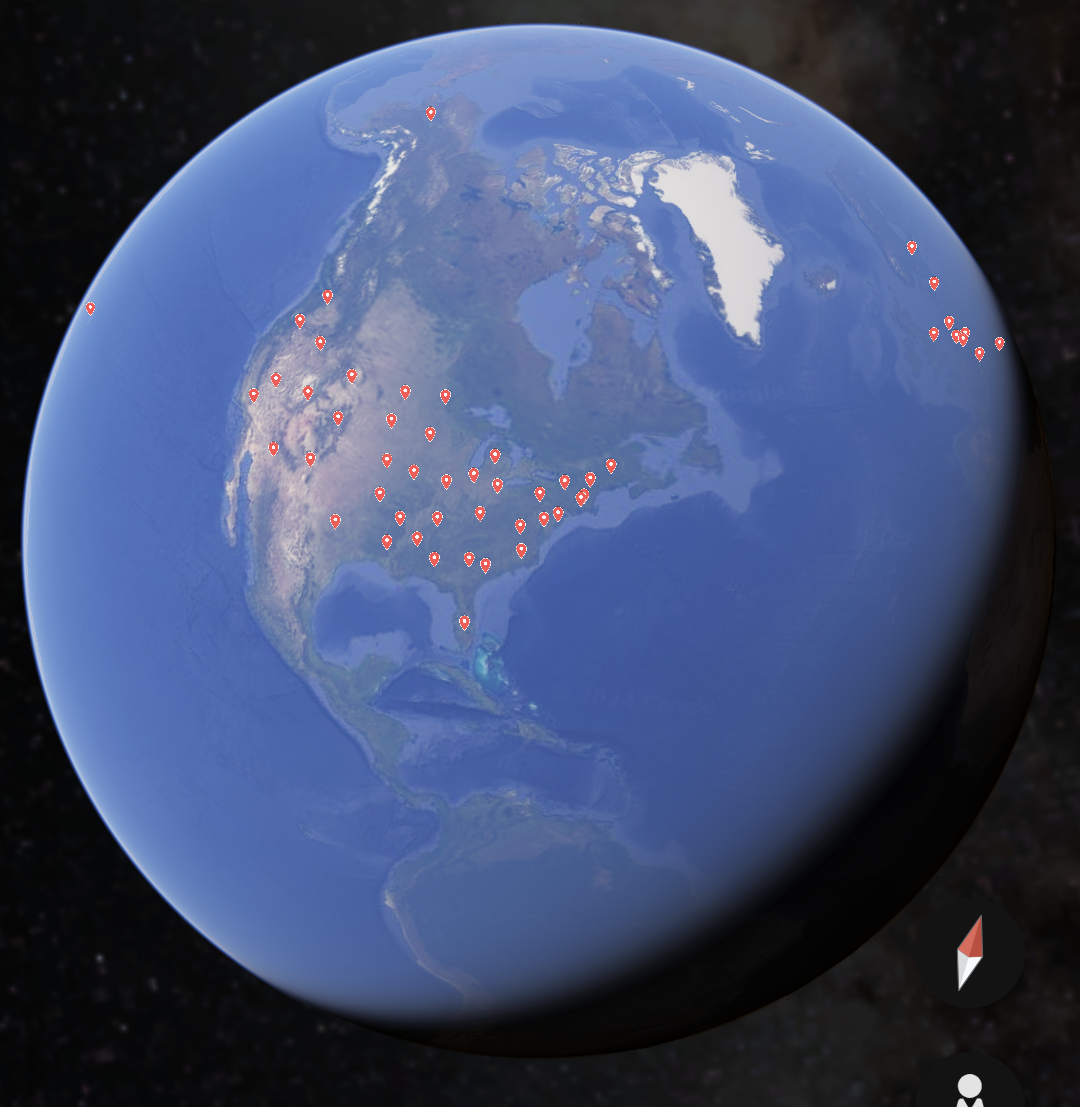
Unitism
The Founding Philosophy of the Unity Party of America
(“Unity Party Around the World” header image map data © 2015-2024 GoogleData SIO, NOAA, U.S. Navy, NGA, GEBCOLandsat / CopernicusIBCAO)
Unitism is simply the belief that, if we’re on this Blue Marble together, we should all start acting like it!
One way to think of Unitism is “Nations Without Borders,” and of uniting as Uniters within those nations.
The Blue Marble, an official publication of the Unity Party of America, will be coming one day soon!
You might argue that Ulysses S. Grant, 18th President of the United States, was the first Unitist. This paragraph is an excerpt from his second inaugural address in March of 1873. It should be noted that this remarkable set of four sentences delivered at the height of his power by a notably conservative President (Grant very much created the Republican Party we knew until Trump) was accepted with little objection.
“In future, while I hold my present office, the subject of acquisition of territory must have the support of the people before I will recommend any proposition looking to such acquisition. I say here, however, that I do not share in the apprehension held by many as to the danger of governments becoming weakened and destroyed by reason of their extension of territory. Commerce, education, and rapid transit of thought and matter by telegraph and steam have changed all this. Rather do I believe that our Great Maker is preparing the world, in His own good time, to become one nation, speaking one language, and when armies and navies will be no longer required.”
Another clearly would-be Unitist was Winston Churchill (another gentleman, who, as you can clearly see from the most iconic image of him above, wasn’t exactly a flame-throwing revoluationary, but, rather, on the contrary, a traditional conservative much in the vein of Grant). In Zurich in 1946 (Switzerland is a rather interesting choice as a venue, is it not?), Churchill (whose mother was American, a fact often overlooked by historians), proposed a “United States of Europe” as the clear answer, amidst the ashes of World War II, to the question of how to prevent another war in Europe. And Churchill had clearly been thinking along these lines for years, at least since a remarkable lunch with a certain future French President Charles de Gaulle at the Carlton Club in London in 1940, during which the two gentlemen agreed that the answer to the crisis of the then-ongoing Nazi invasion of Western Europe and the impending collapse of the French Third Republic (German troops had entered Paris just two days before) was a “Franco-British Union.” Lest you think the conversation was merely the result of one of the two knocking back a few too many, here’s the draft of the proposal drawn up by “civil servants” on both sides of the English Channel and to be found on the British Parliament’s official website:
"At this most fateful moment in the history of the modern world the Governments of the United Kingdom and the French Republic make this declaration of indissoluble union and unyielding resolution in their common defence of justice and freedom, against subjection to a system which reduces mankind to a life of robots and slaves.
The two Governments declare that France and Great Britain shall no longer be two nations but one Franco-British Union. The constitution of the Union will provide for joint organs of defence, foreign, financial, and economic policies. Every citizen of France will enjoy immediately citizenship of Great Britain, every British subject will become a citizen of France.
Both countries will share responsibility for the repair of the devastation of war, wherever it occurs in their territories, and the resources of both shall be equally, and as one, applied to that purpose.
During the war there shall be a single war Cabinet, and all the forces of Britain and France, whether on land, sea, or in the air, will be placed under its direction. It will govern from wherever it best can. The two Parliaments will be formally associated.
The nations of the British Empire are already forming new armies. France will keep her available forces in the field, on the sea, and in the air.
The Union appeals to the United States to fortify the economic resources of the Allies and to bring her powerful material aid to the common cause.
The Union will concentrate its whole energy against the power of the enemy no matter where the battle may be. And thus we shall conquer."
As Churchill’s private secretary, Sir John Colville, put it, “We had before us the bridge to a new world, the first elements of European or even World Federation.” An initially skeptical Churchill, it was said, was “swept along” by the enthusiasm of others, who, unfortunately, apparently included everyone but the French leadership, which would soon capitulate to Hitler and usher in a new Dark Age for France.
Speaking of the UK, don’t forget the example of the Acts of Union of 1707, which began the formation of the United Kingdom as we know it today. The English had their own motivations, but the Scottish motivations were primarily economic, and there were clear economics benefits, at least up until Brexit.
And speaking of France, don’t forget about the example of Jean Monnet, the dapper Frenchman who was the driving force behind that nearly-successful effort at Union in 1940 (this former cognac salesman would go on to found what would later become the European Union). Perhaps the only real problem with the European Union is the attachment of the word “European”?
And while we’re still covering the black-and-white era of history, don’t forget that Albert Einstein, the same gentleman who was fully capable of ignoring the conventional wisdom and seeing things the way they truly are (ever heard of his Theories of Relativity?), adamantly and publicly advocated the concept of a “world government” in the years following the creation of the nuclear weapons he had unwittingly helped lay the scientific foundation for. His “final goal” was “the establishment of a supranational authority vested with sufficient legislative and executive powers to keep the peace.”
No doubt Einstein would’ve been intrigued by the creation of both the Unity Party of Germany and the Unity Party of Switzerland (he was born in the former country and lived in both countries).
Credits: (Left) Kremlin.ru (Right) Kremlin.ru
A few even-more surprising examples of potential Unitists would be Boris Yeltsin … and Vladimir Putin. Four days before the final disolution of the Soviet Union in 1991, Russian President Boris Yeltsin sent a letter to NATO suggesting that he wished Russia to join the organization. That letter might have been sent out of desperation (the entire Soviet Union was falling into anarchy at the time), but, a decade later, his successor Vladimir Putin quite calmly and consistently expressed a continued interest in Russia joining NATO, until the Powers That Be rebuffed the Russian president (apparently out of a lack of imagination) and sent him and the former Russian Empire down a dark and much more dangerous path. One might say that, even then, it’s quite a leap from NATO membership to membership in the EU, but the EU once attempted to effectively become the United States of Europe, that very same President Putin apparently invaded Ukraine out of a belief that memberships in suprational organizations tend to be a slippery slope.
Moving forward: be sure to visit that same Nations Without Borders page for a (rapidly growing) list of nations where foreign donations to domestic political parties are allowed, and thus where we’re able to work to kickstart homegrown Unity Parties advancing our worldwide and world-changing Unitist message.
Also be sure to visit the first official webpage of the Digital Nomad Union, a branch of the Unity Party that’s putting Unitism into action by fighting for the rightful rights of remote workers around the world!
Citizens of the world, don’t be a slave to the history that’s already happened. Citizens of the world, unite!
Header photo credit: Public Domain






